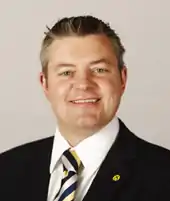Stuart McMillan
Stuart McMillan (born 6 May 1972) is a Scottish National Party (SNP) politician. He has been the Member of the Scottish Parliament (MSP) for the Greenock and Inverclyde constituency since 2016, having previously represented the West of Scotland region 2007−2016.
Stuart McMillan | |
|---|---|
 | |
| Deputy Convener of the Scottish Parliament Delegrated Powers and Law Reform Committee | |
| Assumed office 14 June 2011 | |
| Preceded by | Marlyn Glen |
| Succeeded by | Marco Biagi |
| Member of the Scottish Parliament for Greenock and Inverclyde | |
| Assumed office 6 May 2016 | |
| Preceded by | Duncan McNeil |
| Majority | 8,230 |
| Member of the Scottish Parliament for West Scotland | |
| In office 3 May 2007 – 26 March 2016 | |
| Preceded by | Campbell Martin |
| Succeeded by | Ken Macintosh |
| Personal details | |
| Born | 6 May 1972 Barrow in Furness |
| Political party | Scottish National Party |
| Alma mater | Abertay University |
| Website | Official website |
Early life
Stuart McMillan was born in Barrow in Furness in Cumbria, England, on 6 May 1972.[1][2] He moved to Inverclyde when he was a child, where he attended Port Glasgow High School.[1] After attending Central College of Commerce, Glasgow, he studied at the University of Abertay in Dundee where he graduated with a BA (Hons) in European Business Management with Languages and latterly a MBA.[2] Once graduated he worked for IBM before working for Scottish National Party central office in Westminster. Before being elected in 2007, he was office manager to Scottish National Party Member of the Scottish Parliament Bruce McFee.
Parliamentary career
In 2007 Scottish Parliament election he stood as the SNP candidate for Greenock and Inverclyde constituency, beaten by Labour's Duncan McNeil[3] but was then elected on the regional list for the West of Scotland region.[4] He contested the seat again in the 2011 election which McNeil won with a majority of 511 and McMillan also returned to parliament through the regional list. Stuart was elected as the MSP for Greenock & Inverclyde on 5 May 2016 with a 53.7% vote share and a massive 8,230 majority, becoming the first SNP member to win this constituency at the Scottish Parliament.[5]
During his time as an MSP, Stuart has led campaigns on a number of issues in Inverclyde including a campaign to reduce the price of fuel in the area, improving the trunk road network, increasing marine tourism and tackling drug misuse. He has also been very vocal in his support for action to be taken against the rise of fixed-odds betting terminals, securing a victory in 2018 when the UK Government finally agreed to limit the maximum stake to £2.[6] In 2014, McMillan led a Members' Debate in the Scottish Parliament calling on the Scottish and Westminster Government's to take action on, what he described as "cash cows" for bookmakers.[7] He has also lobbied the Scottish Government for money to support flood prevention measures in Inverclyde.
At McMillan's request, Inverclyde Council agreed to invite former gamblers into secondary schools to speak to pupils about the dangers of gambling.[8]
In 2014, McMillan also led a Members' Debate in the Scottish Parliament on the increasing reliance of food banks in Scotland. He was the first MSP to raise the issue in the Scottish Parliament and continues to work with and support the local foodbanks.[9]
At present, Stuart is the Deputy Convener of the Scottish Parliament's Delegated Powers and Law Reform Committee and is also a member of the Covid-19 Committee and also Convenes the Cross-Party Groups on Tourism, Visual Impairment and Recreational Boating and Marine Tourism.[10]
Stuart is also the Scottish Parliament's Parliamentary Piper and plays the pipes at official functions for the Parliament. In 2017, Stuart toured the country and played the pipes at all 42 senior football grounds in Scotland raising money for charity.[11]
Stuart is a lifetime honorary member of Action on Asbestos and is currently taking forward a Member's Bill to recovery the NHS the medical costs relating to industrial disease.[12]
On 3 May 2015 he was elected to the board of Moving On Inverclyde, a charity which supports recovery from problematic substance use (drugs and alcohol).[13]
References
- "Current MSPs: Stuart McMillan: Personal Information". Scottish Parliament. Retrieved 30 June 2016.
- "Stuart McMillan". Scottish National Party. Retrieved 30 June 2016.
- "Scottish elections 2007: Greenock & Inverclyde". BBC News. 4 May 2007.
- "Scottish elections 2007: West of Scotland". BBC News. 17 May 2007. Retrieved 30 June 2016.
- Bryan, Alastair (6 May 2016). "Nicola Sturgeon hails stunning SNP election performance". STV News.
- http://www.thehighlandtimes.com/news/2018/05/17/maximum-fobts-stake-reduced/
- https://www.youtube.com/watch?v=psI1ezv7ocY
- "Gamblers go into schools". Greenock Telegraph. 30 May 2014. Retrieved 30 June 2016.
- https://www.youtube.com/watch?v=iF4WygnywhY
- https://www.parliament.scot/msps/currentmsps/stuart-mcmillan-msp.aspx
- https://gmfc.net/2017/07/17/msp-kicks-off-charity-pipeathon-at-cappielow/
- https://www.parliament.scot/parliamentarybusiness/Bills/108147.aspx
- https://www.inverclydenow.com/community-noticeboard/getting-to-the-art-of-the-matter-at-msp-s-office